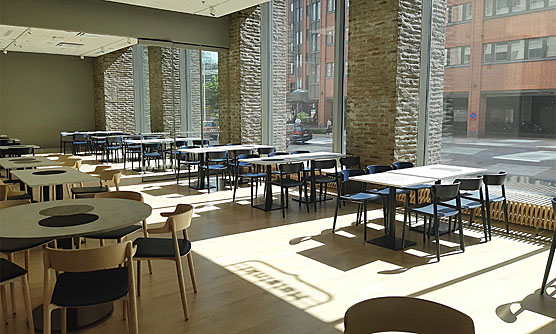
© Palmia
Procurement of food services has been identified by the City of Helsinki as a place of influence that enables the city to promote a sustainable food system and reduce the climate impacts caused by food production. As part of the Canemure project, Helsinki tendered for a restaurant service for the new urban environment house, taking into account the climate aspects.
With the completion of the new urban environment house, services located in different parts of the urban environment sector in Helsinki will move under the same roof. Approximately 1,500 urban environment workers are moving into the building.
“The restaurant service production of the new premises was to be developed in accordance with the city's carbon neutrality objective. It was hoped that the service provider would be a responsible pioneer, aware of the environmental and climate impacts of the service, and would take them into account in their operations and communicate about responsible choices to their customers,” says Project Coordinator Miia Herzon from the City of Helsinki.
Clear requirements for climate-friendliness guided the procurement process
The city's aim was clearly recorded in the procurement service description of the environment house’s restaurant service. The selected producer was required to commit to the responsibility and climate-friendliness criteria defined in the procurement description and to reduce its carbon footprint.
The criteria included the quantity and quality of vegetarian and vegan food options, climate-friendly raw materials, traceability of meat, seasonal raw materials and the reduction of food waste.
In addition, the service provider was required to communicate responsible and nutritionally recommended choices to the restaurant's customers.
Monitoring the carbon footprint of the restaurant service
The outcome of the tender was satisfactory and a responsible operator was selected as the provider of the restaurant service. However, the starting up of restaurant operations was made more difficult by the coronavirus pandemic, which led to a more gradual starting up of operations.
“Although the restaurant's sales during the coronavirus period have been significantly lower than usual, the staff of the Urban Environment House as well as external customers have made good use of the restaurant,” says Herzon.
During the contract period of the restaurant service, the City of Helsinki, with the help of the service provider, will determine the carbon footprint of the restaurant service. The survey will use the carbon footprint calculator for food services developed by the Finnish Environment Institute. After the calculation, the necessary goals, measures and their monitoring will be agreed upon to develop the restaurant service and reduce its carbon footprint.
Learn more
Further information
- Project Coordinator Miia Herzon, City of Helsinki, firstname.surname@hel.fi, tel. +358 (0)9 3104 2138